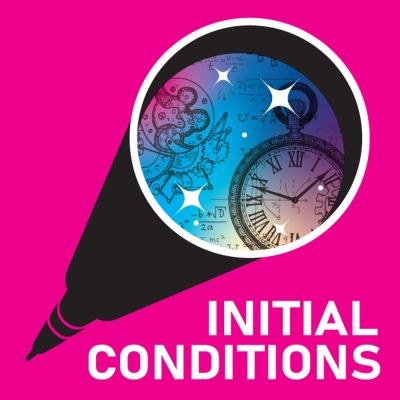Initial conditions provide the context in which physics happens. Likewise, in Initial Conditions: a Physics History Podcast, we provide the context in which physical discoveries happened. We dive into the collections of the Niels Bohr Library & Archives at the American Institute of Physics to uncover the unexpected stories behind the physics we know. Through these stories, we hope to challenge the conventional history of what it means to be a physicist.
http://www.aip.org/initialconditions
Gesamtlänge aller Episoden: 11 hours 40 minutes
- 1
- 2
- 1
- 2
episode 14: Bonus: Initial Conditions Off Mic
Justin, Maura, and Allison reflect on the creation of Initial Conditions and speak to some of the other staff at the Niels Bohr Library & Archives and the Center for History of Physics. They share their favorite episodes, the episodes they wish they had made, and the difficulties of making a podcast from scratch...
episode 13: Bonus: Live from PhysCon!
In this episode, Justin and Maura interview speakers and students who attended the 2022 Society for Physics Students Physics Congress. Dame Jocelyn Bell Burnell shares the story of her 1967 discovery of radio pulsars and her omission from the Nobel Prize awarded for that discovery. Nobel Laureate, Dr. John Mather explained the importance of learning about the early universe and the potential of the James Webb Space Telescope. Other guests include Dr...
episode 12: Hawai'i and the Thirty Meter Telescope
Featuring a discussion with experts Samantha Thompson and Kalewa Correa from the Smithsonian Institution, this episode is about the history of Hawai’i and the controversy surrounding the Thirty Meter Telescope (TMT). The TMT Corporation’s Board of Directors selected Maunakea as its preferred site in 2009...
episode 11: The Legacy of Ptolemy’s Almagest
This episode dives into the story of the oldest book in NBLA’s Wenner Collection: a 1528 Latin translation of the Almagest. Claudius Ptolemy wrote the Almagest, originally titled Mathēmatikē Syntaxis, in the 2nd century CE. In the Almagest, Ptolemy proposed a mathematical model to explain and predict the motions of celestial objects. Though his geocentric model was debunked by the 16th century, the text facilitated the great observations and models produced by medieval Arabic astronomers...
episode 10: The Newton You Didn't Know
Apart from his publications on gravity and optics, Newton was also a biblical scholar, religious mystic, and alchemist. In fact, a great deal of his work focuses on subjects that modern audiences might not consider to be scientific. You might be surprised to know how important the study of alchemy was to Newton. More than a pet interest, alchemy was an important part of Newton’s attempt to understand the nature of the divine...
episode 9: The Unexpected Hero of Light
This is the story of how a Pittsburgh steel worker became the lensmaker behind some of the most important experiments of 19th century physics. John Brashear fell in love with the night sky as a kid in the 1840s. Though he took a job as a millwright, in his free time, he and his wife dedicated themselves to making a telescope lens so they could view the stars...
episode 8: An Interview with Dr. Ronald Mickens
In June, after several technical mishaps, I flew down to Atlanta, Georgia, to meet Dr. Ronald Mickens and talk about his research on the history of African American physicists. In this episode, you’ll hear my interview with Dr. Mickens...
episode 7: The African American Presence in Physics
Based on the Ronald E. Mickens collection, this episode describes the history of the community of Black physicists in the United States. In 1999 the American Physical Society celebrated its centennial. In conjunction with the celebration, Dr. Ronald Mickens and his colleagues created an exhibit on the community of African American physicists and their contributions to the field during the twentieth century...
episode 6: Historical Romance and LGBTQ+ Representation
This episode will tell the stories of Caroline Herschel and Mary Somerville. It features an interview with Olivia Waite, who combines the two historic women in the protagonist of her regency, sapphic, romance novel The Lady’s Guide to Celestial Mechanics. Caroline Herschel was the first woman to discover a comet and artfully navigated the scientific world of the 18th and early 19th century to become one of the first paid women astronomers...
episode 5: Was Einstein Wrong??
What is pseudoscience? The answer to that question is more difficult than you might think. In trying to answer the question, we can learn a lot more about what science is, how it is practiced, and what goes into producing new scientific knowledge. Based on the work of historian of science Michael Gordin and several collections in the Niels Bohr Library & Archives, this episode examines pseudoscientific theories based on Einstein’s theory of relativity...
- 1
- 2
- 1
- 2
